“We had a record-breaking Giving Tuesday,” said Elaine Ezrapour, director of the Fordham Fund. “It’s very exciting to see the outpouring of ‘phil-‘Ram’-thropy.’”
Held this year on Dec. 3, Giving Tuesday, the Tuesday after Thanksgiving, has become an international day of charitable giving. Since 2015, Fordham has raised hundreds of thousands of dollars each year on this day. But 2019 marked the first year that the University raised more than a million.
Supporting Athletics
The majority of the 1,589 gifts made this year were for Fordham athletics. More than $300,000 in gifts will help support the Frank McLaughlin Family Basketball Court and University sports teams. That includes the Fordham men’s rugby football team, which is raising money to fly to Ireland for the club’s first international tour in more than 50 years.
“Working with the Fordham Fund, we’ve created a Give Campus page for each of the varsity and club teams,” said Edward Kull, senior director of development and senior associate athletic director, adding that the student-athletes and coaches create videos for their teams letting everyone know what their needs are. “So it’s a real collaborative effort.” Squash, crew, football, water polo, and sailing were among the top raisers, he said.
Scholarships for Urban Plunge
More than $6,000 was raised for scholarships for Urban Plunge, a pre-orientation program where first-year undergraduate students participate in community service activities throughout the Bronx and Manhattan. The program, run by the Center for Community Engaged Learning, requires a $250 fee for each student that pays for their meals, transportation, and supplies.
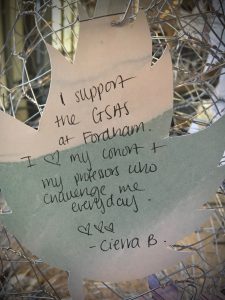
A Double Giving Challenge
This year’s Giving Tuesday offered Rams a double challenge. If 350 donors made a gift by 11:59 a.m. EST, then Susan Conley Salice, FCRH ’82, and Thomas P. Salice, GABELLI ’82, would contribute $20,000. After the goal was achieved, the Salices presented the second half of the challenge: If 200 more donors made a gift by 11:59 p.m. EST, the couple would give another $20,000 to Fordham. Thanks to 550 donors, both challenges were met and the Salices donated $40,000.
Student Support
Students across the University helped spearhead donation efforts, too. In O’Hare Hall, student callers reached out to dozens of alumni, parents, and friends of Fordham. Usually, they work three hours a day, Ezrapour said. But on Giving Tuesday, they worked from roughly 10 a.m. to 10 p.m. and secured 150 gifts over the phone.
Further downtown, the Student Philanthropy Committee at Lincoln Center set up a tabling session in the Lowenstein Center. For the first time, they created a “giving tree” fashioned out of chicken wire and multicolored leaf cut-outs. Committee members asked passing students to write on a leaf the things they are grateful for at Fordham—including causes they want to support in the future.
“They wrote wonderful notes about the different areas on campus that they feel connected to and care about,” Ezrapour said. “It was a great effort on their part, not only in raising awareness about Giving Tuesday, but also demonstrating to the campus community just how many potential areas there are to support.”
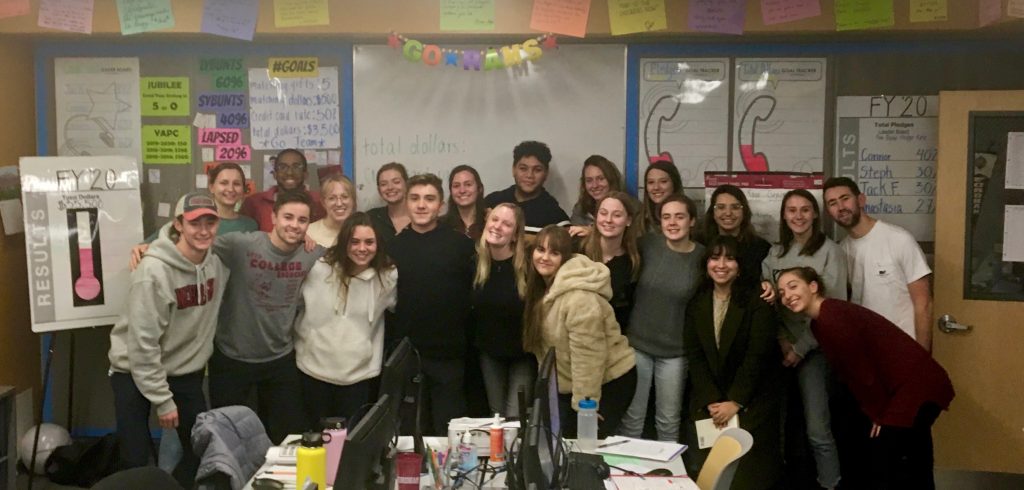
“Faith & Hope has created opportunities for students of diverse socioeconomic backgrounds to come to Fordham, earn a world-class education, and seek employment,” said Susan Conley Salice, FCRH ’82, one of three campaign co-chairs and a first-generation college graduate herself. “These scholarships open doors to students who may not otherwise be able to attend, and give them the opportunity to transform their lives.”
The campaign raised $175,311,288 from April 2014 to June 2019, surpassing its original goal of $175 million. Donations funded existing scholarship funds and 197 new scholarship funds for students—including Fulbright scholars, community leaders, and first-generation college students.
“Scholarships are at the heart of Fordham’s mission, and are central to the Jesuit notion of service to the human family,” said Joseph M. McShane, S.J., president of Fordham. “Scholarships transform individual lives, of course, but in democratizing education and knowledge, they also help create a more just world and a more equitable society. I am deeply heartened that so many of our generous alumni and friends agree, and I am forever grateful for their openhearted and openhanded support.”
Breaking Records Across the University
The Faith & Hope campaign achieved historic results for Fordham. The 2017 fiscal year was the most successful single year of fundraising in the University’s history, at $75.8 million. This year, the University’s Development and University Relations (DAUR) division was recognized with a 2019 Educational Fundraising Award for sustained excellence in fundraising programs over the past three years, putting Fordham’s advancement effort among the top 90 colleges and universities in the nation.
At the 2019 Fordham Founder’s Dinner, nearly $2.6 million was raised for Faith & Hope—specifically the Founder’s Undergraduate Scholarship Fund. It was the second-highest amount in the event’s 18-year history, with 100% participation from the Board of Trustees and the President’s Council. During the years of the campaign, the annual event raised nearly $12 million to support Founder’s scholars.
Nearly a million dollars was raised on Fordham’s third annual Giving Day last March—the most successful Giving Day to date. More than 3,000 participants—alumni, parents, students, faculty, staff, and friends of Fordham—raised $933,689 in 1,841 minutes. Most of the donations, which ranged from $1 to $100,000, came from the U.S., but some came from as far as Australia and the Philippines.
One of the campaign’s biggest accomplishments was the creation of the Maurice and Carolyn Cunniffe Presidential Scholars Program—one of the most selective merit scholarships available to Fordham students. Three years ago, the scholarship program was established through a $20 million gift from Maurice J. (Mo) Cunniffe, FCRH ’54, and Carolyn Dursi Cunniffe, Ph.D., UGE ’62, GSAS ’65, ’71. Over the next decade, it will fund a Fordham education—tuition, living expenses, internship, research, and study abroad opportunities—for dozens of talented students.
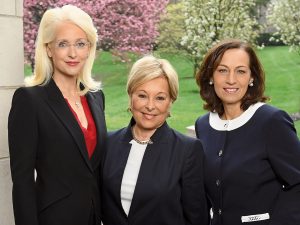
“Each year, Mo and I spend time with these students who are young stars with bright futures,” said Carolyn Cunniffe, a Faith & Hope co-chair. “We hope that they will contribute back to society far more than Mo and I can.”
Campaign co-chair Darlene Luccio Jordan, FCRH ’89, said Faith & Hope supported Fordham’s core values and identity.
“This campaign really went to the central mission of Fordham, which is our commitment to higher education and educating first-generation students, and keeping Fordham accessible, regardless of a student’s ability to pay,” she said.
Student Impact
At the heart of the campaign were Fordham students and the donors who helped fuel their future.
In interviews and speeches spanning the past several years, students have described how a Fordham scholarship has changed their lives.
They talked about how a Fordham education helped shape their career paths. For some students, the University’s Jesuit values strengthened their Catholic faith, while others from different faiths said they felt welcome in the University community. Students also praised Fordham’s core curriculum, which encouraged them to connect with their neighbors in the Bronx. And they spoke about how Fordham helped them understand who they are and what legacy they want to leave behind.
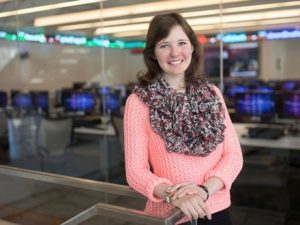
Caroline Koenig, the daughter of seventh-generation French bakers, knew that attending Fordham would be a challenge. In high school, she experienced an injury that dashed her hopes of winning a college track scholarship. Fordham initially gave her a generous financial aid package, but it wasn’t enough. She was taking extra classes to graduate early and considering a commute from Connecticut to save money—that is, until she was awarded the Peter and Carol Howe Endowed Scholarship. It helped her land a summer internship at KPMG and identify her passion for forensic accounting.
“My parents taught me the value of hard work and holding onto your dreams. Because of them and because of Fordham, now I can follow my own,” Koenig said.
The campaign also made a college education possible for Fordham students who, in the face of overwhelming student debt, found it difficult to continue their education.
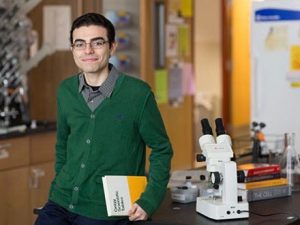
One of them is Muhammad El Shatanofy, the son of immigrant parents who dreamed of becoming a doctor. Throughout his time in Fordham’s neuroscience program, he wondered how he could pay for his undergraduate education without incurring debt. After all, he’d soon be paying for four years’ worth of medical school.
When he found out he was awarded the Founder’s Scholarship, which would pay for almost all his outstanding tuition costs, he was thrilled.
“It really has given me that extra motivation, so that now I just want to accomplish so much,” said El Shatanofy, who went on to mentor 12 high school students from disadvantaged high schools and volunteer at Mt. Sinai Hospital. “I have this drive to make other people happy that they invested in my education and my future.”
For many students, scholarships have left an emotional impact on their lives.
“There’s just no words I can give to express how thankful my family and I are. It takes a big load off our shoulders, and … I’m just so thankful because I wouldn’t be able to go to Fordham without you and apply to grad school,” Jeannie-Fay Veloso, GABELLI ’17, tells her scholarship donor, Robert D. Daleo, GABELLI ’72, in a campaign video. Seconds later, the two alumni embrace in tears.
What It Means to Give
Faith & Hope’s scholarships were made possible through donations both big and small.
Among the campaign’s biggest donors, in addition to the co-chairs and their spouses, were Brian W. and Kathleen H. MacLean, both FCRH ’75; Susheel Kirpalani, LAW ’94; William J. Loschert, GABELLI ’61; Alice Lehman Murphy, the McKeon Family Foundation; Grace A. Dorney-Koppel, UGE ’60, and Ted Koppel; and Alex and Jean Trebek.
Many of them said they give back because they want to support the next generation of leaders and help families break out of the cycle of poverty through education. Some donors once stood in the same shoes as the students they now support.
“I came from a family where my father was a factory worker and my mother worked as a seamstress. I had two other brothers. So if I was going to do it, I was going to do it on my own—and my brother, too,” said Daleo, honorary campaign chair and chair of the Fordham Board of Trustees, who established a scholarship in his brother’s name. “We both went to Fordham. We both had scholarships, worked and paid our way. That scholarship helped me [and] made the difference.”
Rosemary Santana Cooney, Ph.D., established a scholarship with her husband Patrick in recognition of her 42 years as a professor and associate dean at Fordham, her belief in generating a diverse student body, and her Puerto Rican heritage. Her scholarship will support minority students across Fordham.
“I was always aware that I was different—an outsider—because I tend to be dark, like my father. And I always worked extra hard because I figured as a woman and a minority, you had to work extra hard … I know, sympathetically, how hard these kids who try to make the transition are having to work. And I wanted to make sure that some of them were getting some help,” said Cooney.
For many donors, their Fordham experience gave them not only academic, social, and life skills—it showed them what they’re capable of.
“It’s taught me things about myself that I didn’t even know before,” said Sophie Scott, FCLC ’18, who studied journalism and now works as a production assistant at CNN. “Fordham literally showed me the world in a way I didn’t know possible, and a way I could fit into the world.”
Scott, echoing a sentiment shared by many donors, said she hopes to give that same experience to someone else.
“It literally brings me no greater joy than to think that someone else could be having that same experience—someone who, from a financial perspective, may not be able to,” said Scott, who serves as chair of the Young Alumni Philanthropy Committee at Fordham.
Faith & Hope marks the third of Fordham’s biggest campaigns since the early 1990s—a growing list of campaigns that are already transforming the world.
“It really is a win-win for both the donors and the students,” said Salice. “And ultimately, the world at large.”
Now that the University has successfully closed Faith & Hope, administrators and volunteers are planning for the launch of a new fundraising campaign that will be focused on enhancing the student experience and will include the construction of a new campus center at Rose Hill.
To read more success stories, visit the Faith & Hope campaign site.
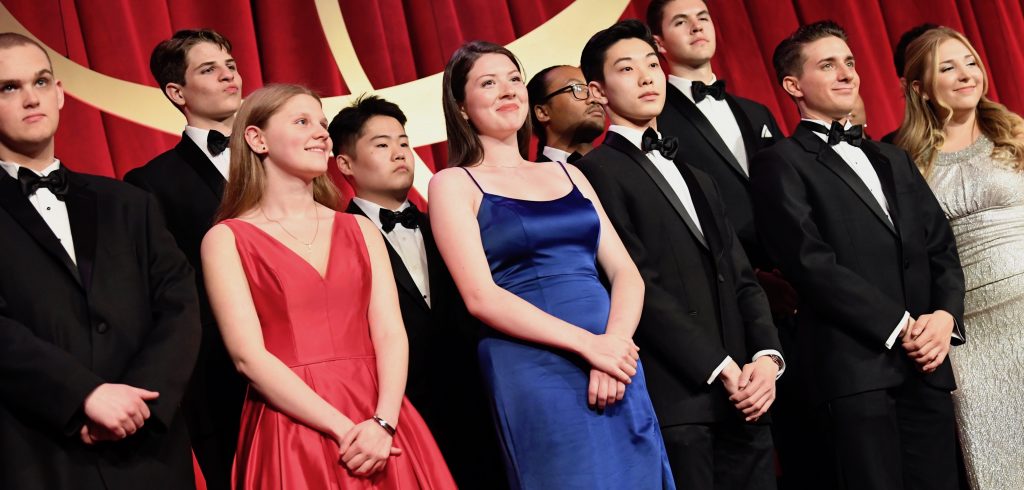
This year, six Pioneering Women in Philanthropy will be honored for the personal and financial support they have given Fordham. Leaders in their fields, each one has invested in bettering their communities and the world in their own way. Here, they share their thoughts on the importance of mentorship, empathy, self-confidence, and more on the path to success—for them and for all women.
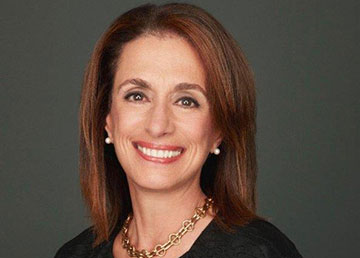 In cosmetics, which is where I particularly grew up, we had these wonderful [women] role models. … If you’ve been given this road map and you see that others have gone before you and achieved, you never have in your mind the notion of failure. You have the notion that you can do it too, if you’re good enough and smart enough and make the right decisions.
In cosmetics, which is where I particularly grew up, we had these wonderful [women] role models. … If you’ve been given this road map and you see that others have gone before you and achieved, you never have in your mind the notion of failure. You have the notion that you can do it too, if you’re good enough and smart enough and make the right decisions.
—Rose Marie Bravo, CBE, TMC ’71
Bravo grew up in the Bronx, the daughter of an Italian-born barber and a seamstress from Sicily. A Bronx High School of Science graduate, she earned a bachelor’s degree in English cum laude at Fordham’s Thomas More College in 1971 and later held leadership positions in several major fashion businesses—including Macy’s and Saks Fifth Avenue. She took over Burberry in 1997 and is widely credited with transforming the classic brand and greatly expanding its markets during her nine-year tenure as CEO. In 2006, Queen Elizabeth II recognized Bravo’s achievements in promoting British fashion, naming her a Commander of the British Empire.
Bravo will deliver a keynote address, “From the Bronx to Buckingham Palace,” at this year’s Women’s Philanthropy Summit.
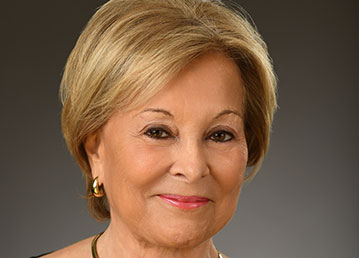 I entered the work world bolstered by an amazing education in liberal arts that made me feel strong and confident. Still, to rise up the corporate ladder meant more than just feeling confident. I soon learned that it meant persistence and resilience, not being afraid to ask for help, and so much more. I quickly realized the importance of communicating, listening, adaptability, and using words like “us” “we” and “with.” I learned that the best leaders hire strong people, set goals, don’t make excuses, are empathetic, and understand their own self-worth.
I entered the work world bolstered by an amazing education in liberal arts that made me feel strong and confident. Still, to rise up the corporate ladder meant more than just feeling confident. I soon learned that it meant persistence and resilience, not being afraid to ask for help, and so much more. I quickly realized the importance of communicating, listening, adaptability, and using words like “us” “we” and “with.” I learned that the best leaders hire strong people, set goals, don’t make excuses, are empathetic, and understand their own self-worth.
—Carolyn Dursi Cunniffe, Ph.D., UGE ’62, GSAS ’65, ’71
Dursi Cunniffe grew up in a family of eight, including two brothers who also went to Fordham. Fluent in French and Italian, she studied at the Sorbonne and the University of Perugia as well as Fordham, where she earned bachelor’s, master’s, and doctoral degrees in French literature. She had a successful career as an executive in the cosmetics industry and, later, in executive recruiting. She spent 13 years at Revlon, rising to vice president at a time when that title was a rarity for women. She was a senior vice president and the key strategist in recruiting senior talent at Cablevision Systems Corporation before retiring in 2011. Her husband, Maurice “Mo” Cunniffe, FCRH ’54, is a fellow Fordham grad.
 From my parents, I was always encouraged to be kind and fair—and to always let people know they are valued and loved. I think women have that capacity to inspire people by their passion, compassion, and empathy. Women stand tall for their beliefs and by nature have the ability to listen and compromise. We know how to bring people together and we are problem solvers.
From my parents, I was always encouraged to be kind and fair—and to always let people know they are valued and loved. I think women have that capacity to inspire people by their passion, compassion, and empathy. Women stand tall for their beliefs and by nature have the ability to listen and compromise. We know how to bring people together and we are problem solvers.
—Barbara Dane, Ph.D., GSS ’67, ’85
Dane is a retired professor of clinical social work who has maintained a private clinical practice, working with dying and grieving persons and their families, since 1971. She earned both her M.S.W. and Ph.D. in gerontology from Fordham’s Graduate School of Social Service. She has taught at Fordham, Columbia University, and NYU, and has a substantial publishing record in social work. Dane was awarded a summer fellowship from the National Institutes of Health to conduct research on aging, and she was among the first recipients of a social work leadership grant from the Soros Foundation’s Project on Death in America. Her research on Thai women coping with HIV/AIDS and the role of meditation was presented at the Seventh International Interdisciplinary Congress on Women in Tromsø, Norway.
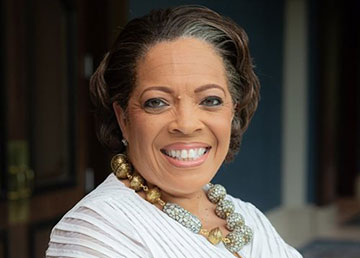 What I know is that we each have the opportunity to change a life every day, to share wisdom from experiences that can help one another, even if we don’t get to hear the triumphant follow-up story. What counts is what we give to lift others up around us, no matter how big or small our gift may be.
What I know is that we each have the opportunity to change a life every day, to share wisdom from experiences that can help one another, even if we don’t get to hear the triumphant follow-up story. What counts is what we give to lift others up around us, no matter how big or small our gift may be.
—Valerie Rainford, FCRH ’86
Rainford is head of advancing black leaders and diversity advancement strategies at JPMorgan Chase. She earned a bachelor’s degree in economics from Fordham. Prior to joining JPMorgan Chase, she served at the Federal Reserve Bank of New York for 21 years, where she rose to become the most senior black woman there and the first to rise to senior vice president. The author of an award-winning memoir, Until the Brighter Tomorrow: One Woman’s Courageous Climb from the Projects to the Podium (Eloree Press, 2014), she has dedicated much of her life to uplifting others by sharing her story of perseverance, as she did with local Bronx students on the Rose Hill campus in August.
Rainford will deliver a keynote address, “Paying It Forward: A Journey of Resilience and Giving Back,” at this year’s Women’s Philanthropy Summit.
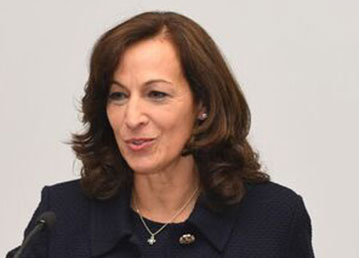 Being a leader is about continuous learning, hands-on engagement, and the power of giving time and resources. Women do this exceptionally well. The challenge is to understand the exciting opportunities for change, and to still find time for self-care and reflection.
Being a leader is about continuous learning, hands-on engagement, and the power of giving time and resources. Women do this exceptionally well. The challenge is to understand the exciting opportunities for change, and to still find time for self-care and reflection.
—Susan Conley Salice, FCRH ’82
Conley Salice is the president of the Salice Family Foundation. She also serves on the boards and chairs the development committees of Fordham University, Catholic Charities of the Archdiocese of New York, and Greenwich Hospital. Before shifting her focus to philanthropy, she worked in the business sector for two decades. She earned a bachelor’s degree in psychology from Fordham College at Rose Hill and a master’s degree in fundraising and philanthropy from New York University. She was one of the keynote speakers at the inaugural Women’s Philanthropy Summit in 2017.
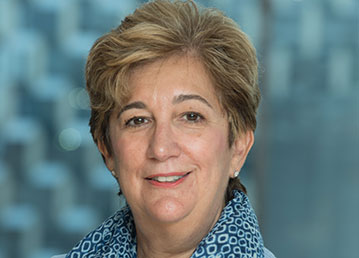 Women who have succeeded in business need to discuss how we navigated the workplace. These experiences are especially relevant today as some business leaders and politicians are seeking to erode the progress that women have made in this world. Women continually face discrimination based on their gender and have an especially tough path to managerial roles in many organizations. A man is considered tough when he makes a strong point while a woman is considered to be too emotional when making a similar point in a similar tone of voice. These stereotypes need to be put to rest. We must lead through a combination of common sense, empathy, and determination.
Women who have succeeded in business need to discuss how we navigated the workplace. These experiences are especially relevant today as some business leaders and politicians are seeking to erode the progress that women have made in this world. Women continually face discrimination based on their gender and have an especially tough path to managerial roles in many organizations. A man is considered tough when he makes a strong point while a woman is considered to be too emotional when making a similar point in a similar tone of voice. These stereotypes need to be put to rest. We must lead through a combination of common sense, empathy, and determination.
—Donna Smolens, FCRH ’79, GSAS ’81
Smolens has been a senior advisor at Insight Partners, a leading global private equity and venture capital firm, since 2015. Prior to joining Insight, she worked at Portfolio Advisors LLC, was a voting member on the investment committees of numerous Portfolio Advisors funds, and was on the advisory boards of 13 private equity funds. She previously worked at Crossover Ventures, DLJ Securities Private Fund Group, General Motors Investment Management, and New York Life Insurance Company. She graduated from Fordham University with both a B.A. and an M.A. in economics.
]]>Now Susan Conley Salice, FCRH ’82, and Thomas P. Salice, GABELLI ’82, have made another investment in Fordham and its students. Their latest gift—$2 million—will support several important initiatives, leading with student scholarship as a part of Fordham’s Faith & Hope | The Campaign for Financial Aid.
The Salices are among the University’s most generous alumni. In addition to other gifts, they donated to Fordham’s last capital campaign, Excelsior | Ever Upward | The Campaign for Fordham, to build the Salice and Conley residence hall on the Rose Hill campus, named in honor of their parents. The residence has housed hundreds of Fordham students since 2010.
Susan says there’s a good reason why they give.
“We both required scholarship dollars in order to be able to attend Fordham,” she said. She was one of the first members of her family to earn a bachelor’s degree, as was Tom the first to attend college in his family.
“If Fordham hadn’t come through, our lives would likely be quite different. We felt that the Jesuit education and values we received and embraced at Fordham made a significant difference in our lives individually—and, of course, together. That’s very powerful when you think about it.”
She has fond memories from her four years at Fordham—tutoring middle school students in the Bronx, working the grill at the McDonald’s on Fordham Road, studying for what seemed like endless hours in the library, sitting at Sunday night Mass at the University Church with her future husband. She also recalled a more recent special moment from last May—the day she and her husband saw their daughter graduate from Fordham’s Graduate School of Social Service. But perhaps most importantly, she feels the weight of her Fordham education at work in the skills she developed as an undergrad: leadership, curiosity, and awareness of the world around her.
“I graduated from Fordham being much more community-aware, world-aware. You question everything, interested in understanding the why,” she said, “and understanding that you have an opportunity and a responsibility to become engaged difference makers in the community and the world at large, for the greater good.”
Tom, a Fordham trustee fellow, went on to become co-founder and managing member of a private equity firm SFW Capital Partners, and the chairman of its investment committee; Susan became a vice president at Diversified Investment Advisors, a retirement investment firm.
Today, Susan devotes much of her time and resources to the causes that are important to her and her family. She is co-chair of Fordham’s Faith & Hope | The Campaign for Financial Aid and a University trustee. She also serves on other nonprofit boards. In 2017, she was also a keynote speaker at Fordham’s first annual Women’s Philanthropy Summit.
“Giving [to scholarships] is an opportunity to change a life—to make an impact in whatever capacity you are able to do so,” she said in her keynote speech.
“Many people can usually afford more than they think they can—and I mean that in a very simple way,” she added. “Perhaps one can give up Starbucks for a week and donate that money. Over the course of a year, that amount can add up and have an important impact.”
She encourages potential donors to reconnect with their alma mater and recall how it felt to be a young, 20-something college kid with all the possibilities in the world.
“When you first graduate, you’re busy. You’re working. You may be raising a family,” she said. “But if you are able to make time to go back to campus, listen to a lecture, attend an event, actually talk to students and professors, you’re going to reconnect with Fordham. You will see the promise students hold in their faces and the potential each has to live as women and men for others.”
]]>The all-day summit drew about 250 alumnae, students, faculty, and friends to Fordham Law School for a series of keynote speeches, forums, pep talks, networking breaks, and even a five-minute yoga session. But more than that, it was a chance for them to gather in the same room and discuss something they all had in common: how much Fordham meant to them.
The Power of Philanthropy
One of the first speakers was Gabelli School junior Arnell Stewart, who explained how alumnae donations directly impacted her life.
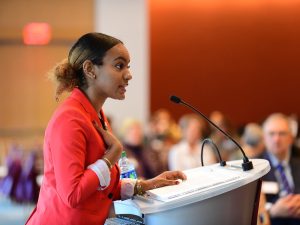
When Stewart’s older brother died suddenly last year, the family faced financial hardship. But with the help of two women—Stewart’s CSTEP counselor Tiffany House and Christina Seix Dow, TMC ’72, who established the Fordham scholarship Stewart received—she knew she could continue to attend college.
“This was the first good thing to happen to my family since the tragedy,” Stewart said, fighting back tears.
“Because of this blessing and Ms. Seix Dow’s generosity, I can stand here before you today as a member of the Fordham community, but also as one of the strong leading ladies here in this room today.”
How Do You Begin?
Many of the day’s speakers acknowledged that for women, pride in one’s wealth and success—and the power they bring—has not always come naturally.
“Some women feel uncomfortable with the idea of wealth. For men, for generations, it’s been culturally and socially acceptable—generally speaking—to be okay with that idea of, ‘I’m wealthy. I’m rich,’” said Veronica Dagher, GABELLI ’00, ’05, a senior wealth management reporter at The Wall Street Journal and a panelist at the summit. “For women though, in general, that’s been frowned upon.”
So for many, thinking about philanthropy has not been top of mind. But guests gained some insight on how to take their first steps toward giving from the day’s first keynote speaker, Harriet Edelman, GABELLI ’80, Vice Chair of Emigrant Bank—the largest privately held, family-owned-and-run community bank in the nation. Her advice: first pinpoint what you’re passionate about, consider how you want to donate—alone versus with “like-minded souls,” establish a budget, learn how to say no, and research possible organizations through sources like Charity Navigator.
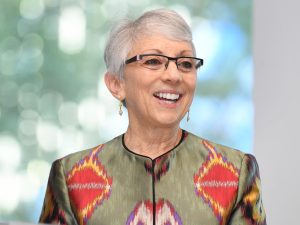
And while she acknowledged that differences between men and women may be part of the day’s discussions, it wasn’t a critical point of focus for her.
“What matters,” Edelman said, “is why you give—why one gives; and, based on the fact that you are here, it means we have a common desire to be intentional and responsible, and share a common interest in the success and sustainability of Fordham.”
Kirsten N. Swinth, Ph.D., associate professor of history and American studies at Fordham, spoke about societal challenges for women in her keynote, “Women Organizing for Change: Feminism’s Forgotten Fight for Work and Family.”
“We are one of two nations in the entire world that does not have [mandatory] paid maternity leave,” Swinth. “Our companion in that status is Papua New Guinea.”
Swinth said that women can take action by joining or creating groups like giving circles, building workplace networks and unions, getting more involved with the government, protesting when necessary, and, perhaps most difficult of all, prioritizing the “collective restructuring of society.”
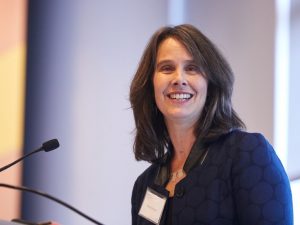
At the keynote panel session Women’s Giving: How Women Accumulate and Distribute Wealth, panelists discussed how women are achieving parity in the United States.
“Right now, in the United States, 39 percent of the top wealth holders are women. Forty percent of U.S. households have a female breadwinner. And 45 percent of the millionaires in the United States are women,” said the panel’s moderator, Elizabeth S. Zeigler, GSE ’00, CEO of Graham-Pelton Consulting.
And at Fordham, thousands of women possess potential financial power—perhaps more than we think.
“More than half of Fordham’s living alumni are women,” said Martha K. Hirst, Fordham’s senior vice president, CFO, and treasurer. “Which means together with the women among the University’s friends, faculty, administrators, staff, and other supporters, our collective impact potential on the University we love is boundless.”
Having It All: A Career, Love, Family, and Happiness
One of the day’s most popular panels was Work/Life Balance at Every Stage of Your Life, a forum where women traded stories about how they balance their careers with everything else: motherhood, romance, and “me time.” They acknowledged that women often feel that others have a better handle on the balancing act than they do.
“We live in a day and age where you can constantly be bombarded with the ‘perfect’ [on social media] and somebody else who appears to be doing it better than you’re doing it. You have some sort of imposter syndrome. And why is that? You’re doing so well. You’ve achieved so much so early in your career. Why would you think that that’s not success?” said Beth Savino, GABELLI ’03, a partner in asset management practice at PricewaterhouseCoopers.
Marianne Cooper, FCRH ’77, a managing director at IBM who is a breast cancer survivor and the mother of a child with special needs, noted that priorities shift with age. And, she said, it’s important to take stock of what you will leave behind.
“What do you want to get out of your life?” asked Cooper. “When you go on, hopefully, up to heaven, how do you want to be remembered by your family, friends, and colleagues?”
[doptg id=”124″]Finding Meaning in Giving
Alumnae held a candid conversation about the spirituality behind giving at Keeping the Faith: Engaging the Next Generation in Conversations of Spirituality and Service, a panel moderated by Christine Firer Hinze, professor of Christian ethics and director of the Curran Center for American Catholic Studies at Fordham.
“Beyond the huge terrible things that are going on in the world today, there are day-to-day tragedies and heartbreaks. You can feel overwhelmed, like nothing you can do makes a difference,” said Anne Conroy, FCRH ’79, director of development and communications at the Center for Family Representation. “By being involved—whether it’s a faith community, a social justice opportunity, whether it’s giving to nonprofits or volunteering—my experience has been doing those things makes me feel less alone; it gives me a sense of hope and optimism. And as a Christian, I feel more connected to God.”
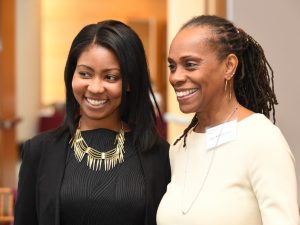
The day’s closing keynote speaker, Anne L. Williams-Isom, FCLC ’86, CEO of Harlem Children’s Zone, talked about meaningful opportunities that giving can provide. She urged all the women in the room to consider how they could help others achieve the American dream. Williams-Isom, the daughter of a single mother from Trinidad and Tobago, acknowledged that it’s difficult—but not impossible.
“I know you guys don’t want to hear about ‘stretching beyond your reach’ because everybody feels like they’re pulled to their limit,” said Williams-Isom, who serves on the University’s President’s Council and works to end generational poverty in Harlem by providing high-quality education and social services to children and families. “I’m here to tell you that you haven’t even begun to touch all the potential that is inside of you.”
Honoring the Past, Looking Toward the Future
The summit honored a group of women who have supported Fordham students in various ways. Receiving the Pioneering Woman in Philanthropy Award were Mary Higgins Clark, FCLC ’79; Rosemary Santana Cooney; Eugenie F. Doyle, M.D., MC ’43; Christine Driessen, GABELLI ’77; Brenda L. Gill, LAW ’95; Alice Lehman Murphy; Frances K. Reid; Margaret Mary (Peggy) Smyth, FCRH ’85; and Valerie Torres, FCRH ’83, GRE ’01, ’08.
Doyle, a retired professor of pediatrics and director of the division of pediatric cardiology at the New York University Medical Center, was a pioneering practitioner of using open-heart surgery to save babies with a rare disorder: “blue baby syndrome.” She and her late husband, Joseph, established two scholarships that benefit pre-health students at Fordham.
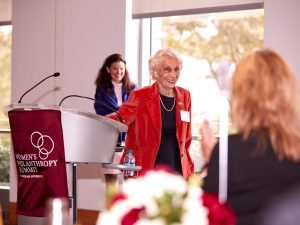
“You have quite literally changed the world, one baby and one student at a time,” Justine Franklin, senior director of development at Fordham, said to Doyle. “And have shown all of us how working for the common good is truly life-giving.”
The second summit also recognized Fordham’s six new giving circles—groups of individuals who donate money to a pooled fund and collectively decide how the money should be spent—that were established at last year’s summit. In just a year, the circles have raised more than $400,000 in Fordham scholarship funds.
“Joining a giving circle is a great first step in the start of your charitable giving journey,” said Susan Conley Salice, FCRH ’82, a University trustee and co-chair of Fordham’s Faith & Hope | The Campaign for Financial Aid. “By raising money as part of a fundraising group, your giving impact is that much more powerful and allows for you to connect with others who share your unique passion for helping Fordham educate more deserving students.”
Last year’s inaugural Women’s Philanthropy Summit raised almost half a million dollars. Donations for this year’s summit are just starting to come in. But perhaps more important than dollar amounts is the question of how to educate the next generation of philanthropists, said one alumna.
“How are we ensuring that the next generation of leaders are being cultivated with a love of community, a heart for justice, and a heart for servant leadership and love of neighbor?” asked Laura Risimini, FCLC ’10, GSAS ’13, foundation manager of the Sister Fund. “And what are we doing to make sure that the next generation—which is going to be taking the reins of leadership soon in the next couple of decades—is prepared?
“Our future literally depends on it.”
Complete bios of all speakers, panelists, and honorees can be found here.
]]> “I love it. It just smells so new,” she said.
“I love it. It just smells so new,” she said.
Katherine’s mom, Cheri McNabola, said she was thrilled that her daughter will live in the dormitory, which—along with Salice and Conley Halls—officially opened its doors to students on Aug. 30.
Cheri’s joy was apparent, even though she had to ride the train from Connecticut to Rose Hill by herself that morning while the rest of the family traveled by SUV. With the vehicle full of Katherine’s stuff, there was simply no room for her.
“It’s OK; I’m allowed to embarrass her. I’m her mother,” Cheri McNabola joked on her way into her daughter’s four-person apartment, while dad Jack McNabola wheeled in a tall stack of plastic containers—all belonging to Katherine.
“At least she’s got the room for it,” added Cheri, as she surveyed the sunny environs. “This apartment is wonderful. It’s got such great light and even a living room.”
Katherine McNabola and her three roommates were among 460 students to inaugurate CSC, as the new buildings are called.
Campbell Hall was built thanks to Robert E. Campbell (CBA ’55) and his wife, Joan M. Campbell. Thomas P. Salice (CBA ’82) and his wife, Susan Conley Salice (FCRH ’82), are the benefactors of Salice and Conley Halls. They are the first dormitories to open at Rose Hill since O’Hare Hall in 2000.
The new halls consist of four towers in two buildings on the southwest side of the campus near Fordham Road. Only upperclassmen get the honor of living there; approximately 70 percent of residents are seniors, while the rest are a mix of juniors and sophomores.
Unlike typical university dormitories, CSC offers “urban lifestyle” housing with modern amenities and technologies.
Fordham’s first LEED-certified Gold buildings, the new halls offer several living arrangements. Apartments are designed to house four students in four single rooms or two double rooms; five students in five single rooms; or six students in three double rooms. More than half of the rooms offer single occupancy.
The apartments are fully furnished and boast air conditioning, climate control within apartments and kitchens equipped with dishwashers and microwaves. It is the kitchen that most excites Matt Tracey, a senior in Fordham College at Rose Hill.
“I cannot wait to cook!” he said. Matt’s mother, Jolene Tracey, promptly chimed in that she will miss her son’s cooking.
“He sure has some lucky roommates,” she said.
Matt said that the first dinner at his apartment would be a lamb dish with a special reduction. “All you need is a skillet,” he said.
“I can’t tell you enough how happy I am that I no longer have to buy a meal plan,” he added.
The new residence halls are a step up from the drab dorm rooms of yesteryear. They feature brightly colored accent walls in the living rooms and bedrooms, and sleek lighting fixtures throughout. The first-floor laundry room is another bonus. Student athlete Kim Capicotto, a senior in the College of Business Administration, said she likes the open design of the “laundry lounge.”
“It’s much better than having to go the basement—and the appliances are brand new, which means everything dries faster,” she said.
Amenities and interior design are not the only perks for CSC residents. The new halls will offer a variety of programming, said resident assistant Alex Slavtchev, a senior in Fordham College at Rose Hill.
“We want to foster community,” Slavtchev said. “A lot of programming will focus on transitioning from college to real life. It’s not just for seniors; it’s something that sophomores and juniors should start thinking about, too.”
Career Services at Fordham will be on hand every Wednesday to help students polish their resumes and plan their careers. The Office of Academic Affairs also will be an integral part of programming, as will the Office of University Mission and Ministry.
In fact, the leader of University mission and ministry was CSC’s first resident, having moved in two weeks ago.
“I was the only guest at a 460-room hotel,” said Monsignor Joseph G. Quinn, vice president for University mission and ministry. His residence continues Fordham’s tradition of an “integrated living community” style of housing.
“These are truly 21st century facilities; our students are so blessed to have such extraordinary residences,” Monsignor Quinn said. “I can’t get over how quiet the buildings are. I can’t hear the Metro North trains. It’s amazing.”
Monsignor Quinn has arranged for motivational speaker and New York Times bestselling author Matthew Kelly to speak to CSC students on Wednesday, Sept. 8.
“It is one of the many activities we will have to help our students leave here with a more discerned feeling about what they are supposed to do in life,” he said.
Contact: Gina Vergel
(212) 636-7175
[email protected]

Photo by Jon Roemer
When Salice and Conley Halls rise from the western side of the Rose Hill campus, they will have their foundations in the Jesuit ethic of men and women for others.
Thomas P. Salice, CBA ’82, and Susan Conley Salice, FCRH ’82, who donated $7 million to the University for the new dormitories, met on the “A” train as Fordham undergraduates, chaperoning a group of Bronx schoolchildren to a baseball game. Since then the couple have continued down the track of service to others.
“At Fordham I felt a part of a community that was about education and a sense of responsibility to a broader community,” said Thomas Salice. “We were taught that we had a responsibility to use our talents and gifts as widely as possible. There was a sense of obligation, of duty, to someone other than oneself.”
Salice, a member of Fordham’s Board of Trustees, was the first person in his family to attend college, and Susan Conley Salice was among the first in her family to earn a bachelor’s degree. The word “responsibility” crops up frequently in conversation with the Salices, and both are adamant about the importance of using their gifts to give others the same opportunities they had. Prior to endowing the dormitories, they had given generously to Fordham, and established the Thomas and Susan Conley Salice Scholarship Fund.
“We were always concerned about helping other people,” said Susan Conley Salice, who, in addition to tutoring neighborhood children after school, worked at the McDonald’s on Fordham Road while she was a student. “Tom and I are passionate about Fordham, and when Tom joined the Board, he felt his expertise and experience could benefit the Fordham community. As the capital campaign progressed, we thought a great deal about how to make an important impact. We had many discussions with Father McShane, and in the end it came down to where the need was the greatest.”
The Salices believe giving to the University is all the more important during the current difficult environment. “Given the financial and economic climate, it’s more critical that donors continue to support Fordham. There is no doubt that these are difficult times; there is also no doubt that the University’s need for resources, as well as the needs of others, is greater now then it was before the financial and economic crisis,” they said.
The new residence halls, two towers joined at the base, will provide housing for 460 students. Salice and Conley Halls will together encompass 76,000 square feet and are expected to open their doors to students in June 2010. The dormitories will house integrated learning community seminar rooms that professors can use to teach classes. The new halls will offer students a greater interconnectedness of residential, academic and social life at Fordham.
Susan Conley Salice, one of six children, originally from the Lake George Region, said, “My family life growing up was centered on Catholic values; the belief in hard work, commitment and one’s ability to make a difference.” After 16 years as an executive in the retirement services industry, Conley Salice settled at their home in Westchester County to raise the couple’s three daughters. She became engaged in and led many volunteer activities, which has motivated her to formalize her study in the master’s program in philanthropy and fundraising at New York University.
Thomas Salice is a co-founder and managing member of SFW Capital Partners, a private equity firm, and the chairman of its investment committee. He has nearly 15 years of investment experience in the analytical products and services sectors, and currently serves as lead director of Waters Corporation and Mettler-Toledo International. He largely attributes his interest in finance, and entrée into that world, to Fordham.
“Fordham’s proximity to Manhattan and the financial world opened my eyes to the different disciplines in finance,” Salice said. “The New York City financial community seemed to be a foreign and inaccessible island to me. My father was a carpenter and no one in my family had gone to college, but my parents pushed and inspired me to pursue higher education and a professional career where I could make the best us of my abilities.”
Salice talked himself into a paid internship with what was then Lehman Brothers, Kuhn, Loeb Inc., after offering to work for free in the firm’s research department where he was given an assignment to write a report on the seed industry. The report so impressed his superiors that Salice earned a paid internship that carried him through the rest of his Fordham education. He went on to earn an M.B.A. at Harvard University.
Both Thomas and Susan received financial aid and merit scholarships to attend Fordham. They describe themselves as “blessed,” and said the scholarship they endowed was to help “kids like ourselves.” The additional commitment for the dormitories was an opportunity to have the greatest effect and inspiration on future generations of students. The couple chose to name the residence halls in recognition of their parents for their sacrifice and support.
“I often say to our students that I want them to leave Fordham ‘bothered,’” said Joseph M. McShane, S.J., president of the University, “bothered by injustice, bothered by poverty, bothered by suffering. With Tom and Sue Salice we have succeeded beyond our wildest dreams. Their generosity and their commitment is both humbling and deeply gratifying to witness. When someone asks me, ‘What is the value of a Fordham education?’ I have only to point at the Salices and say, ‘There, there it is.’”
“None of this could have happened if we weren’t at Fordham,” Thomas Salice said.
]]>